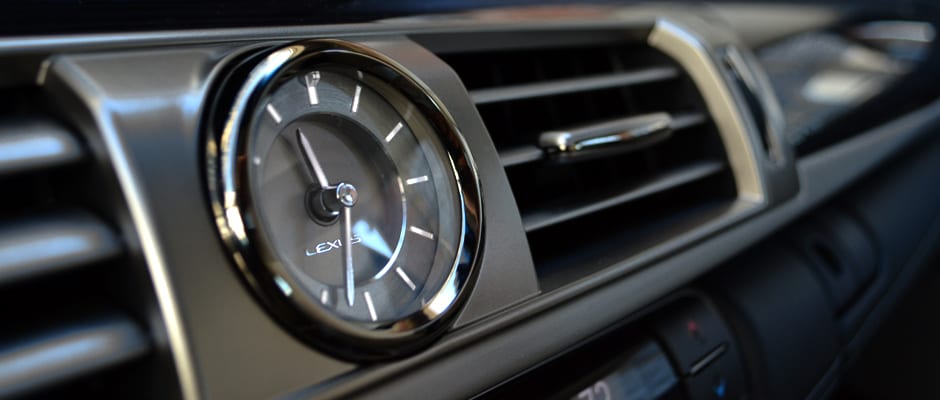I spent a week with an LS 460 AWD (MSRP $82,010), and was constantly reminded of just how much effort went into designing and building this car. While it's now outclassed by nearly all its competitors on measures of cutting-edge tech, breathtaking style, and laughter-inducing driving excitement, it just might be the most well-crafted luxury sedan ever made.
{{brightcove '2730068154001'}}
Consider the climate control panel. Lexus could've plucked an LCD display from the global Toyota parts bin and made it fit. Instead, there's a unique screen featuring bright numbers that artificially "roll over" in a tasteful animation when you switch from, say, 71 to 72 degrees.
It doesn't stop there. Every surface, every moving part, every gap has been engineered to minimize disquiet. It's no secret that Lexus makes a lot of hay about a supposedly fastidious engineering department, but I'm happy to say that more than twenty years since the famous "ball bearing" commercial, the company is still nailing the details.
On the road, the LS is a similar study in stability. There's no pitch or roll no matter how hard you push the car. San Francisco skyscrapers have more extraneous motion. The tradeoff, however, is a car utterly devoid of agility. You get the sense that it's aimed at the extremely risk averse—or at least those who prefer to take their chances on a balance sheet, not on a back road. And that inability to move outside of its comfort zone—and what a comfortable zone it is!—is the difference between an exceptionally well-made car and an exceptional car, period.
Even in Sport mode, the LS 460's massive 4.6 liter V8 isn't tuned for acceleration. Punch the gas and the massive sedan doesn't spring to life so much as it resumes an inevitable forward motion. Once again, it's imperceptible. That's acceptable for an executive sedan with a focus on comfort, and those who really want more excitement from their LS can try out the LS 460 F Sport. Our only complaint about the powertrain—aside from fuel economy in the high teens—was that the eight-speed automatic occasionally shuffled its way through gear changes in when pressed, such as during highway passing maneuvers.
Available options include rear-seat entertainment, a stretched wheelbase, an air suspension, upgraded upholstery, and a "Climate Concierge" that automatically adjusts heated and cooled seats to maintain an optimal temperature. Active safety features are bundled together in a single option package, and include lane keep assist, dynamic cruise control, auto-braking, pedestrian detection, and even a system that monitors a driver's eyes to make sure he or she is awake and paying attention to the road. Missing is the infamous "auto park" option. It may have debuted on the LS, but now self parking is reserved for the Range Rover, Toyota Prius V, and even a $24,000 Ford Focus.
As for infotainment, the LS 460 has Lexus' great Enform system on a wide, 12.3-inch screen that offers enough room for a song title to display next to a map. It's not a touchscreen, and is controlled instead by Lexus' Remote Touch interface—a mouse in the center console that offers haptic feedback, "nudging" your hand to relevant on-screen selections. It's been a polarizing feature ever since its debut. I had no major problems, but wanted for a physical back button and the ease of pointing at a screen to select a function.
{{brightcove '2730068146001'}}
Enform's software is essentially the same as Toyota's Entune, which relies on your smartphone's data plan to run apps tailored for in-car use. I had no problem pairing my iPhone (I hadn't yet upgraded to iOS 7 at the time of the test) and found it useful to make dinner reservations while on the road and take advantage of Bing's ability to search for destinations.
If you're really stumped, Lexus puts you in touch with a real person: Destination Assist hands you off to a human being with computer access, who can give you helpful advice like distance to a destination or restaurant ratings. The agent we talked to got us the information we requested in short order and sent it straight to the nav system. It's like having a personal concierge, and could really come in handy for road warriors.
The problem with the LS 460 is that exceptionally well-made cars don't come cheap. There's the inevitable cost of engineering, and cynics may claim that makers of luxury cars ratchet up prices to match the open wallets of price-insensitive customers. The LS starts at $72,140, and can easily break $110,000 with options.
And that great Enform system? After the first year, there's a $264.90 annual fee for all connectivity services. You can use standalone features like navigation, but apps are bundled with Safety Connect. Yes, it includes emergency response and roadside assistance, but the cost doesn't seem worth it for app access alone.
If you'd rather not pay that kind of cash for the 21st century's version of a private railcar, you've got plenty of competitors to choose from at your Audi, Jaguar, BMW and Cadillac dealers. If bargains are your thing, consider the Hyundai Equus. It may lack the final polish of the LS 460, but gets 95 percent of the way there for more than a $20,000 discount. If you're willing to suffer the indignity of a visible seam in your dashboard trim or HVAC vents shared with an Elantra, it's a great way to enjoy the goodies of an LS for less.
Meet the tester
Keith was the Editor in Chief of Reviewed's appliance and automotive sites. His work has appeared in publications such as Wired, Car & Driver, and CityLab.
Checking our work.
Our team is here to help you buy the best stuff and love what you own. Our writers, editors, and experts obsess over the products we cover to make sure you're confident and satisfied. Have a different opinion about something we recommend? Email us and we'll compare notes.
Shoot us an email

